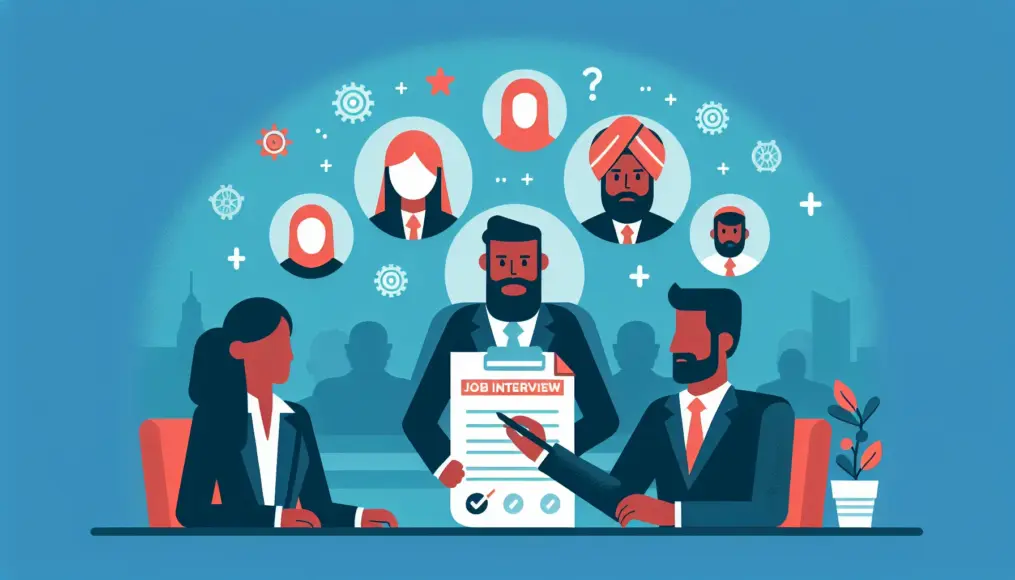When considering a career change, job interviews are an essential step that you simply can’t overlook. They present a significant opportunity to showcase your suitability and enthusiasm for the role through the questions you’ll face.
In this article, we’ll explore common interview questions and strategies to tackle them effectively, as well as how to leave a positive impression with your own questions. With the right preparation and mindset, you can walk into your interview with confidence.
- An overview of common interview questions and their underlying intentions
- Examples of questions to ask that can leave a favorable impression
- Tips on preparation and mindset to ensure interview success
Common Interview Questions for Job Seekers and Their Intentions
When considering a job change, the interview process is a crucial aspect. During interviews, hiring managers ask various questions to assess your suitability and motivation for the role. Understanding these questions and preparing thoroughly can significantly boost your chances of success.
What Hiring Managers Want to Know
It’s essential to grasp the intent behind the questions asked in an interview. Primarily, hiring managers are interested in your work experience, skills, and how well you fit with the company culture. They aim to understand what you’ve learned from your past experiences and how you can contribute moving forward.
These questions often present an opportunity for you to showcase your strengths and achievements. By incorporating specific anecdotes into your answers, you can enhance your credibility and make a more compelling impression.
- Hiring managers want to verify your work experience and skills.
- Many questions are designed to assess your fit with the company.
- Including specific examples increases your credibility.
Examples of Effective Responses to Interview Questions
There are effective ways to respond to interview questions. For instance, when asked, “What are your strengths?”, it’s important to describe your strengths with concrete examples. This approach transforms a simple self-promotion into a persuasive answer grounded in real experiences.
Similarly, when posed with the question, “Why did you choose this company?”, articulate how your values and goals align with the company’s vision. This helps hiring managers perceive your enthusiasm and commitment.
Learning how to effectively respond to interview questions is vital. Additionally, you can prepare comprehensively by referring to Key Points to Remember Before Job Interviews.
- Explain your strengths with concrete examples.
- Communicate your reasons for choosing the company through shared values and goals.
- Persuasive answers foster trust.
How to Make a Great Impression with Reverse Questions in Interviews
At the end of an interview, you’ll typically be given a chance to ask reverse questions. This is not just a formality; it’s a golden opportunity to show your interest and leave a positive impression on your interviewer. By effectively utilizing this opportunity, you can ensure that your interview stands out in their memory.
The Importance of Reverse Questions
Reverse questions are more than just a procedural step. They play a crucial role in highlighting your enthusiasm and genuine interest in the position and company. By asking thoughtful reverse questions, you demonstrate that you are seriously considering what it would be like to work there.
Additionally, these questions can help you gain insight into the workplace atmosphere and culture, which is invaluable in preventing any mismatches after you join the company.
- Reverse questions are a chance to demonstrate your enthusiasm
- They help you understand the workplace atmosphere and culture
- They can prevent mismatches after you start working
Examples of Effective Reverse Questions and Their Impact
So, what kinds of questions work well as reverse questions? For instance, asking, “What do you think is the most important aspect of working at this company?” can prompt your interviewer to reflect more deeply. Questions like this signal that you’re trying to grasp the company’s culture and values.
Another excellent question is, “What skills are essential for success in this position?” This not only provides you with specific advice on how to fit into the role, but it also opens up a dialogue about what the company values in its employees. Particularly in executive interviews, there are powerful reverse questions to consider, so check out Effective Reverse Questions for Executive Interviews: Key Points for Career Success for more insights.
- Ask, “What do you think is the most important aspect of working at this company?”
- Inquire, “What skills are essential for success in this position?”
- Questions that prompt deeper consideration from the interviewer are particularly effective
Preparing and Mindset for a Successful Interview
When it comes to successfully navigating a job interview, preparation is key. By adequately preparing in advance, you can approach the interview day with confidence and composure, ultimately leaving a positive impression. Here, we’ll explore the necessary preparations and mindset you should adopt as you get ready for your interview.
Gaining Confidence Through Preparation
Taking the time to prepare for your interview will help you feel more confident on the day. Start by researching the company thoroughly. Understanding the company’s values and business operations will facilitate smoother conversations with the interviewer.
Additionally, it’s important to organize your past work experiences and skills so that you can effectively articulate your self-promotion. This preparation will enable you to respond to the interviewer’s questions calmly. By preparing well, you’ll approach the interview with a sense of ease and be able to relax.
- Research the company beforehand
- Organize your self-promotion points
- Preparation is essential for gaining confidence
Interview Day: Manners and Mindset
On the day of the interview, your manners and mindset are also crucial. First and foremost, arrive at the venue with plenty of time to spare. Punctuality is something you definitely want to avoid compromising. Having extra time will allow you to approach the interview with a calm demeanor. For those looking for more detailed information on interview etiquette, check out Stand Out with Interview Etiquette! Key Points for Success.
Pay attention to your attire and grooming as well. Wearing clean, professional clothing and having a neat hairstyle will help you make a good impression. During the interview, focus on making eye contact and speaking clearly, while maintaining a relaxed posture. Being genuine in your self-expression will leave a positive impression on the interviewer.
- Give yourself enough time to avoid being late
- Maintain a clean and professional appearance
- Express yourself in a relaxed manner
Overlooked Tips for a Successful Interview
When it comes to job interviews, there are well-known tips to follow, but there are also some crucial points that people often overlook. Mastering these aspects can be the key to a successful interview. In particular, non-verbal communication and follow-up after the interview can significantly influence the impression you leave.
The Importance of Non-Verbal Communication
During an interview, it’s not just what you say that matters; your non-verbal communication is equally important. Interviewers pick up on a lot from your facial expressions, attitude, and gestures. For instance, a smile and maintaining eye contact can enhance the sense of trustworthiness.
Pay attention to your posture and movements as well. A confident posture creates a positive impression, while signs of nervousness or fidgeting can have the opposite effect. It’s essential to maintain a relaxed demeanor throughout the interview.
- Non-verbal communication affects impressions
- Smiling and eye contact build trust
- A confident posture creates a positive impression
The Impact of Follow-Up After the Interview
Following up after an interview is another essential aspect that shouldn’t be overlooked. Sending a thank-you email or message can express your gratitude and help you stand out. This follow-up is a great opportunity to showcase your sincerity and enthusiasm. If you want to learn more about crafting a thank-you email after an interview, check out How to Make a Good Impression with a Thank-You Email After a Part-Time Job Interview.
Additionally, referencing points from your conversation during the interview can demonstrate your interest and engagement. This can help you stay memorable in the interviewer’s mind. Since follow-up can potentially influence your hiring outcome, it’s definitely worth putting into practice.
- Convey gratitude with a thank-you email
- Mention memorable topics from the interview
- Follow-up can impact hiring decisions
Summary
To succeed in job interviews, thorough preparation and the right mindset are crucial. Particularly, your ability to provide effective answers to interview questions and to ask insightful follow-up questions can significantly impact the impression you leave. Additionally, non-verbal communication and post-interview follow-ups are key elements that shouldn’t be overlooked.
By preparing diligently, you can boost your confidence and aim to make a positive impression on the interviewer. Keeping these points in mind will help you take a significant step toward a successful job search.
- Preparation is the key to interview success
- Use follow-up questions to create a positive impression
- Non-verbal communication and follow-ups are essential
Wishing you the best of luck in your job interviews! We’d love to hear about your experiences and thoughts in the comments.



Comment